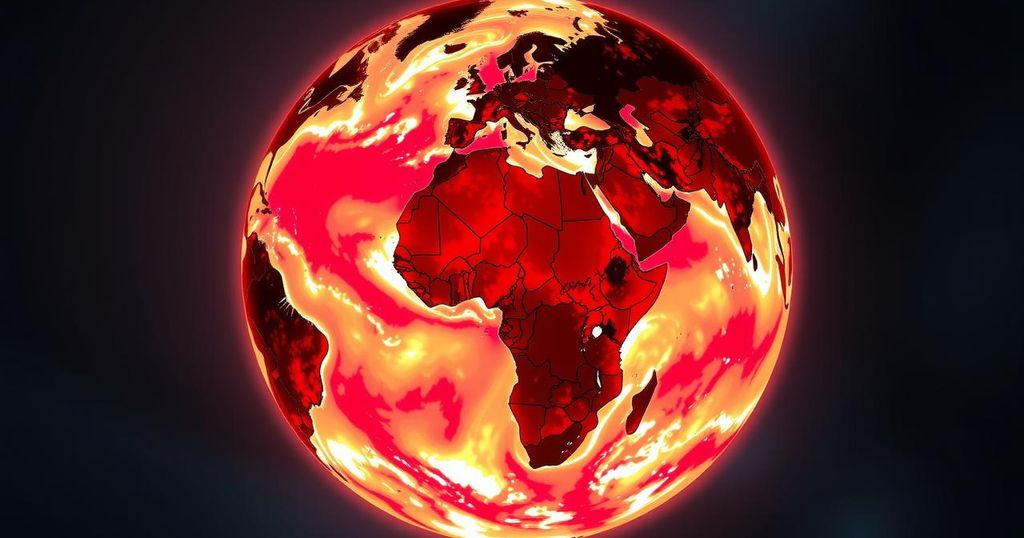Weather
AFRICA, ARCTIC, ASIA, CLIMATE, COPERNICUS, COPERNICUS CLIMATE CHANGE SERVICE, EUROPE, EXTREME WEATHER, FORECAST, GLOBAL WARMING, GREENHOUSE GAS EMISSIONS, NASA, NATIONAL CENTERS FOR ENVIRONMENTAL INFORMATION, NCEI, NOAA, NORTH AMERICA, OCEANIA, SERVICE, SOUTH AMERICA, UK MET OFFICE, WEATHER
Jamal Robinson
0 Comments
2024: The Warmest Year on Record Highlights Urgent Climate Crisis
In 2024, the Earth experienced its warmest year on record, with average land and ocean temperatures exceeding previous highs. The Antarctic sea ice extent was at its second-lowest level, while ocean heat content reached unprecedented levels. Tropical cyclone activity remained near average, highlighting the diverse impacts of climate change. Scientists urge immediate action to address climate challenges based on these concerning trends.
In a comprehensive analysis conducted by scientists from the National Oceanic and Atmospheric Administration’s (NOAA) National Centers for Environmental Information (NCEI), it has been confirmed that 2024 stands as the warmest year on record globally. The report highlights a notable increase in temperatures, where Earth’s average land and ocean surface temperature reached 2.32 degrees Fahrenheit (1.29 degrees Celsius) above the 20th-century average. This temperature is 0.18 degrees Fahrenheit (0.10 degrees Celsius) warmer than the preceding record set in 2023.
Regions including Africa, Europe, North America, Oceania, and South America experienced their hottest years on record, while Asia and the Arctic reported their second-warmest years. Alarmingly, for the past decade, all of the planet’s ten warmest years have manifested, a trend that is concerning for future climate stability. Furthermore, data from various scientific organizations corroborate NOAA’s findings, consistently ranking 2024 as the warmest year.
The report also reveals that Antarctic sea ice coverage reached its second-lowest extent in recorded history, averaging 4.00 million square miles in 2024. Notably, the maximum extent observed in September and the minimum extent in February similarly ranked second lowest. Arctic sea ice coverage faired slightly better but still ranked seventh lowest for the year.
An unprecedented heat level was also reported in the upper ocean, with the heat content in the upper 2,000 meters reaching record highs. This increased ocean heat content, a crucial climate indicator, embodies the alarming retention of excess heat within the Earth’s system. In contrast, global tropical cyclone activity in 2024 remained near the average of previous decades, with 85 named storms and an overall cyclone energy lower than the 1991-2020 standard.
These findings underscore the critical state of the planet’s climate, calling for urgent action to mitigate the impacts of climate change.
The year 2024 has been identified as a pivotal moment for global climate awareness, marked by extreme weather patterns and significant shifts in temperature data. As analyses from various scientific institutions converge, they reveal a stark warming trend, which necessitates urgent public and governmental focus. The implications stretch beyond just statistical data, as patterns in sea ice coverage and oceanic heat content have deep repercussions for biodiversity, weather systems, and ultimately human life. The documentation of temperature anomalies on a regional and global scale illustrates the pressing need for proactive environmental strategies.
In summary, the data presented in NOAA’s 2024 global climate report reveals alarming trends regarding the Earth’s rising temperatures and diminishing sea ice coverage, placing 2024 firmly as the warmest year on record. The corroborative findings from other scientific organizations reinforce the urgency surrounding climate change, demanding immediate attention from policymakers and global citizens alike. As the planet navigates an unprecedented climatic landscape, the need for decisive action to combat the adverse effects of climate change has never been more critical.
Original Source: www.noaa.gov




Post Comment